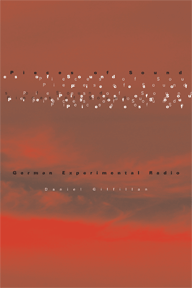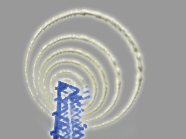| |
Research Projects and Interests
Ongoing Projects
Hans Flesch and Weimar Radio Theory. Edited and translated volume of important theoretical texts from the Weimar period in which radio developed as an important cultural, political, and artistic medium. The volume focuses specifically on the programmatic and theoretical texts of Hans Flesch, the first artistic director at Radio Frankfurt, who later became the guiding voice of cultural radio in Berlin. Proposal submitted to University of Minnesota Press, June 2008.
Ethereal Perception: Sound and the Technical Mediation of Acoustics. Monograph.
Completed Projects
Pieces of Sound: German Experimental Radio
 My first book Pieces of Sound: Experimental German Radio, through the University of Minnesota Press, explores artistic and cultural experimentation with the radio medium from its early days in the 1920s, through its stages of redefinition in the 1950/60s up to its adaptation and expansion of trends in digital innovation in the 1990s and today. The radio is a medium that came of age alongside the emergent media environments of film and television, and we would do well to revisit these past moments of intermedial cross-pollination to look for models that inform the radio's current development beside a plethora of networked telecommunications media. Pieces of Sound does just this. It considers an array of examples from the contemporary German and Austrian media landscapes to explore the ways in which cultural and artistic radio broadcasting experiments with the metaphors, practices and interfaces of networked media not only to expand the artistic and communicative possibilities of the medium, but also to inform perceptions about the use and direction of these newer telecommunications media. And it tempers this discussion through a concerted examination of acoustical examples from the history of German radio, the attendant media theoretical debates that accompanied the radio's development, and the legislative policies and broadcasting standards that regulated its use. My first book Pieces of Sound: Experimental German Radio, through the University of Minnesota Press, explores artistic and cultural experimentation with the radio medium from its early days in the 1920s, through its stages of redefinition in the 1950/60s up to its adaptation and expansion of trends in digital innovation in the 1990s and today. The radio is a medium that came of age alongside the emergent media environments of film and television, and we would do well to revisit these past moments of intermedial cross-pollination to look for models that inform the radio's current development beside a plethora of networked telecommunications media. Pieces of Sound does just this. It considers an array of examples from the contemporary German and Austrian media landscapes to explore the ways in which cultural and artistic radio broadcasting experiments with the metaphors, practices and interfaces of networked media not only to expand the artistic and communicative possibilities of the medium, but also to inform perceptions about the use and direction of these newer telecommunications media. And it tempers this discussion through a concerted examination of acoustical examples from the history of German radio, the attendant media theoretical debates that accompanied the radio's development, and the legislative policies and broadcasting standards that regulated its use.
Pieces of Sound: German Experimental Radio. (Minneapolis, MN: U of Minnesota Press, 2009).
|
Cyberculture + Network Culture + Digital Culture
The urgency and speed of electronic communication has had a ripple
effect within the economic, political, social and cultural spheres.
Not only has the information revolution produced a frenzied global economy,
it has also had a lasting impact on myriad art worlds, political and
protest movements, and socioeconomic and cultural issues. The transformation
of cultural heritage artifacts (documents, art works, photographs, compositions,
symphonies, film) into bits of information capable of being digitally
reproduced ad infinitum begs certain questions about the homogenization
of culture that can and does occur through the digitization process.
The creation of a digital monoculture, easily accessible to all but
those without the network infrastructure allowed by a high-speed internet
backbone, is just one of many issues that the study of digital culture
must face.
A future research project involves looking at web-based representations of the Holocaust on sites located in German, Israeli and American cyberspace, with an eye to:
- asking difficult questions about the electronic commodification of instances of human barbarity (which also have a bearing on contemporary use of digital technologies in waging war on terrorism - digital photography and Abu Ghraib prison - and in committing acts of terror - streaming video of beheadings by insurgents in Iraq)
- interrogating the porous borders between using the web for research purposes and using the web for commercial purposes, and the questions of scholarly integrity which ultimately arise
- exploring the notion of political and nationalist boundaries within cyberspace (i.e. web domains that are country specific; e.g. .de for Germany ) and the United States' unique position outside these networked boundaries.
Dissertation
My dissertation, From Monstrosity to Liberation: Situating Technology in the Work of Alfred Andersch, investigates modern attitudes towards technology and its effect on the modern subject in Andersch's early writings from 1934-1943 and relates them to his later role in radio broadcasting and literary production in the 1950s. With investigations of lyric, narrative, journalism, essay and radio broadcast, including unpublished literary material and radio productions, this chronological examination reveals in Andersch an inquisitive young man caught up in the politics of his youth, an innovative radio technologist and advocate of experimental art and literature, and a critical thinker intent on negotiating, for the welfare of others, the complexities of the world around him. My contributions are not only to examine Andersch's lesser known pre- and postwar literary work and radiocasts, but to locate them for the first time in the context of crucial political and philosophical debates about the democratizing potential of emergent media technologies begun in Weimar.
Humanities Computing
In the midst of my scholarly research into German literary culture
and history of technology, I also have practical training in humanities
computing, an interesting entity lodged within the interstitial space
between recognized humanities disciplines. Generally speaking, humanities
computing investigates the ways in which knowledge is represented within
the humanities and seeks to apply computing methodology to assist and
draw out these representations. In addition to the toolbox of ever-changing
skillsets that a computing humanist must know (coding practices, metadata
standards, scanning parameters, operating systems, project management,
grantwriting, database management, &c.), an effort must be made
to ensure that the scholarly content that comprises the material of
humanities computing does not become fodder for the gristmills of computational
analysis. Humanities computing must not only inform but must also be
informed by the richness and depth of the scholarship that it renders
digitally.
|
|

